- Home
- D. H. Lawrence
Complete Works of D.H. Lawrence (Illustrated) Page 11
Complete Works of D.H. Lawrence (Illustrated) Read online
Page 11
She had been sure in her own soul that Leslie would come — now she began to doubt: — things were very perplexing.
The bell in the kitchen jangled, she jumped up. I went and opened the door. He came in. She gave him one bright look of satisfaction. He saw it, and understood.
“Helen has got some people over — I have been awfully rude to leave them now,” he said quietly.
“What a dreadful day!” said Mother.
“Oh, fearful! Your face is red, Lettie! What have you been doing?”
“Looking into the fire.”
“What did you see?”
“The pictures wouldn’t come plain — nothing.”
He laughed. We were silent for some time.
“You were expecting me?” he murmured.
“Yes — I knew you’d come.”
They were left alone. He came up to her and put his arms round her, as she stood with her elbow on the mantelpiece.
“You do want me,” he pleaded softly.
“Yes,” she murmured.
He held her in his arms and kissed her repeatedly, again and again, till she was out of breath, and put up her hand, and gently pushed her face away.
“You are a cold little lover — you are a shy bird,” he said, laughing into her eyes. He saw her tears rise, swimming on her lids, but not falling.
“Why, my love, my darling — why!” — he put his face to her’s and took the tear on his cheek:
“I know you love me,” he said, gently, all tenderness.
“Do you know,” he murmured. “I can positively feel the tears rising up from my heart and throat. They are quite painful gathering, my love. There — you can do anything with me.”
They were silent for some time. After a while, a rather long while, she came upstairs and found Mother — and at the end of some minutes I heard my mother go to him.
I sat by my window and watched the low clouds reel and stagger past. It seemed as if everything were being swept along — I myself seemed to have lost my substance, to have become detached from concrete things and the firm trodden pavement of everyday life. Onward, always onward, not knowing where, nor why, the wind, the clouds, the rain and the birds and the leaves, everything whirling along — why?
All this time the old crow sat motionless, though the clouds tumbled, and were rent and piled, though the trees bent, and the window-pane shivered with running water. Then I found it had ceased to rain; that there was a sickly yellow sunlight, brightening on some great elm leaves near at hand till they looked like ripe lemons hanging. The crow looked at me — I was certain he looked at me.
“What do you think of it all?” I asked him.
He eyed me with contempt: great featherless, half-winged bird as I was, incomprehensible, contemptible, but awful. I believe he hated me.
“But,” said I, “if a raven could answer, why won’t you?” He looked wearily away. Nevertheless my gaze disquieted him. He turned uneasily; he rose, waved his wings as if for flight, poised, then settled defiantly down again.
“You are no good,” said I, “you won’t help even with a word.”
He sat stolidly unconcerned. Then I heard the lapwings in the meadow crying, crying. They seemed to seek the storm, yet to rail at it. They wheeled in the wind, yet never ceased to complain of it. They enjoyed the struggle, and lamented it in wild lament, through which came a sound of exultation. All the lapwings cried, cried the same tale, “Bitter, bitter, the struggle — for nothing, nothing, nothing” — and all the time they swung about on their broad wings, revelling.
“There,” said I to the crow, “they try it, and find it bitter, but they wouldn’t like to miss it, to sit still like you, you old corpse.”
He could not endure this. He rose in defiance, flapped his wings, and launched off, uttering one “Caw” of sinister foreboding. He was soon whirled away.
I discovered that I was very cold, so I went downstairs.
Twisting a curl round his finger, one of those loose curls that always dance free from the captured hair, Leslie said:
“Look how fond your hair is of me; look how it twines round my finger. Do you know, your hair — the light in it is like — oh — buttercups in the sun.”
“It is like me — it won’t be kept in bounds,” she replied. “Shame if it were — like this, it brushes my face — so — and sets me tingling like music.”
“Behave! Now be still, and I’ll tell you what sort of music you make.”
“Oh — well — tell me.”
“Like the calling of throstles and blackies, in the evening, frightening the pale little wood-anemones, till they run panting and swaying right up to our wall. Like the ringing of bluebells when the bees are at them; like Hippomenes, out-of-breath, laughing because he’d won.”
He kissed her with rapturous admiration.
“Marriage music, sir,” she added.
“What golden apples did I throw?” he asked lightly. “What!” she exclaimed, half mocking.
“This Atalanta,” he replied, looking lovingly upon her, “this Atalanta — I believe she just lagged at last on purpose.”
“You have it,” she cried, laughing, submitting to his caresses. “It was you — the apples of your firm heels — the apples of your eyes — the apples Eve bit — that won me — hein!”
“That was it — you are clever, you are rare. And I’ve won, won the ripe apples of your cheeks, and your breasts, and your very fists — they can’t stop me — and — and — all your roundness and warmness and softness — I’ve won you, Lettie.”
She nodded wickedly, saying:
“All those — those — yes.”
“All — she admits it — everything!”
“Oh! — but let me breathe. Did you claim everything?”
“Yes, and you gave it me.”
“Not yet. Everything though?”
“Every atom.”
“But — now you look — ”
“Did I look aside?”
“With the inward eye. Suppose now we were two angels — ”
“Oh, dear — a sloppy angel!”
“Well — don’t interrupt now — suppose I were one — like the ‘Blessed Damosel’.”
“With a warm bosom — !”
“Don’t be foolish, now — I a ‘Blessed Damosel’ and you kicking the brown beech leaves below thinking — ”
“What are you driving at?”
“Would you be thinking — thoughts like prayers?”
“What on earth do you ask that for? Oh — I think I’d be cursing — eh?”
“No — saying fragrant prayers — that your thin soul might mount up — ”
“Hang thin souls, Lettie! I’m not one of your souly sort. I can’t stand Pre-Raphaelities. You — You’re not a Burne-Jonesess — you’re an Albert Moore. I think there’s more in the warm touch of a soft body than in a prayer. I’ll pray with kisses.”
“And when you can’t?”
“I’ll wait till prayer-time again. By. Jove, I’d rather feel my arms full of you; I’d rather touch that red mouth — you grudger! — than sing hymns with you in any heaven.”
“I’m afraid you’ll never sing hymns with me in heaven.”
“Well — I have you here — yes, I have you now.”
“Our life is but a fading dawn?”
“Liar! — Well, you called me! Besides, I don’t care; ‘Carpe diem’, my rosebud, my fawn. There’s a nice Carmen about a fawn. ‘Time to leave its mother, and venture into a warm embrace.’ Poor old Horace — I’ve forgotten him.”
“Then poor old Horace.”
“Ha! Ha! — Well, I shan’t forget you. What’s that queer look in your eyes?”
“What is it?”
“Nay — you tell me. You are such a tease, there’s no getting to the bottom of you.”
“You can fathom the depth of a kiss — ”
“I will — I will — ”
After a while he asked:
“When shal
l we be properly engaged, Lettie?”
“Oh, wait till Christmas — till I am twenty-one.”
“Nearly three months! Why on earth — ”
“It will make no difference. I shall be able to choose thee of my own free choice then.”
“But three months!”
“I shall consider thee engaged — it doesn’t matter about other people.”
“I thought we should be married in three months.”
“Ah — married in haste — But what will your mother say?”
“Say! Oh, she’ll say it’s the first wise thing I’ve done. You’ll make a fine wife, Lettie, able to entertain, and all that.”
“You will flutter brilliantly.”
“We will.”
“No — you’ll be the moth — I’ll paint your wings — gaudy feather-dust. Then when you lose your coloured dust, when you fly too near the light, or when you play dodge with a butterfly-net — away goes my part — you can’t fly — I — alas, poor me! What becomes of the feather-dust when the moth brushes his wings against a butterfly-net?”
“What are you making so many words about? You don’t know now, do you?”
“No — that I don’t.”
“Then just be comfortable. Let me look at myself in your eyes.”
“Narcissus, Narcissus! — Do you see yourself well? Does the image flatter you? — Or is it a troubled stream, distorting your fair lineaments?”
“I can’t see anything — only feel you looking — you are laughing at me. — What have you behind there — what joke?”
“I — I’m thinking you’re just like Narcissus — a sweet, beautiful youth.”
“Be serious — do.”
“It would be dangerous. You’d die of it, and I — I should — ”
“What!”
“Be just like I am now — serious.”
He looked proudly, thinking she referred to the earnestness of her love.
In the wood the wind rumbled and roared hoarsely overhead, but not a breath stirred among the saddened bracken. An occasional raindrop was shaken out of the trees; I slipped on the wet paths. Black bars striped the grey tree-trunks, where water had trickled down; the bracken was overthrown, its yellow ranks broken. I slid down the steep path to the gate, out of the wood.
Armies of cloud marched in rank across the sky, heavily laden, almost brushing the gorse on the common. The wind was cold and disheartening. The ground sobbed at every step. The brook was full, swirling along, hurrying, talking to itself, in absorbed intent tones. The clouds darkened; I felt the rain. Careless of the mud, I ran, and burst into the farm kitchen.
The children were painting, and they immediately claimed my help.
“Emily — and George — are in the front room,” said the mother quietly, for it was Sunday afternoon. I satisfied the little ones; I said a few words to the mother, and sat down to take off my clogs.
In the parlour, the father, big and comfortable, was sleeping in an arm-chair. Emily was writing at the table — she hurriedly hid her papers when I entered. George was sitting by the fire, reading. He looked up as I entered, and I loved him when he looked up at me, and as he lingered on his quiet “Hullo!” His eyes were beautifully eloquent — as eloquent as a kiss.
We talked in subdued murmurs, because the father was asleep, opulently asleep, his tanned face as still as a brown pear against the wall. The clock itself went slowly, with languid throbs. We gathered round the fire, and talked quietly, about nothing — blissful merely in the sound of our voices, a murmured, soothing sound — a grateful, dispassionate love trio.
At last George rose, put down his book — looked at his father — and went out.
In the barn there was a sound of the pulper crunching the turnips. The crisp strips of turnip sprinkled quietly down on to a heap of gold which grew beneath the pulper. The smell of pulped turnips, keen and sweet, brings back to me the feeling of many winter nights, when frozen hoof-prints crunch in the yard, and Orion is in the south; when a friendship was at its mystical best.
“Pulping on Sunday!” I exclaimed.
“Father didn’t do it yesterday; it’s his work; and I didn’t notice it. You know — Father often forgets — he doesn’t like to have to work in the afternoon — now.”
The cattle stirred in their stalls; the chains rattled round the posts; a cow coughed noisily. When George had finished pulping, and it was quiet enough for talk, just as he was spreading the first layers of chop and turnip and meal — in ran Emily — with her hair in silken, twining confusion, her eyes glowing — to bid us go in to tea before the milking was begun. It was the custom to milk before tea on Sunday — but George abandoned it without demur — his father willed it so, and his father was master, not to be questioned on farm matters, however one disagreed.
The last day in October had been dreary enough; the night could not come too early. We had tea by lamplight, merrily, with the father radiating comfort as, the lamp shone yellow light. Sunday tea was imperfect without a visitor; with me, they always declared, it was perfect. I loved to hear them say so. I smiled, rejoicing quietly into my teacup when the father said:
“It seems proper to have Cyril here at Sunday tea, it seems natural.”
He was most loath to break the delightful bond of the lamp-lit tea-table; he looked up with a half-appealing glance when George at last pushed back his chair and said he supposed he’d better make a start.
“Ay,” said the father in a mild, conciliatory tone, “I’ll be out in a minute.”
The lamp hung against the barn wall, softly illuminating the lower part of the building, where bits of hay and white dust lay in the hollows between the bricks, where the curled chips of turnip scattered orange gleams over the earthen floor; the lofty roof, with its swallows’ nests under the tiles, was deep in shadow, and the corners were full of darkness, hiding, half hiding, the hay, the chopper, the bins. The light shone along the passages before the stalls, glistening on the moist noses of the cattle, and on the whitewash of the walls.
George was very cheerful; but I wanted to tell him my message. When he had finished the feeding, and had at last sat down to milk, I said:
“I told you Leslie Tempest was at our house when I came away.”
He sat with the bucket between his knees, his hands at the cow’s udder, about to begin to milk. He looked up a question at me.
“They are practically engaged now,” I said.
He did not turn his eyes away, but he ceased to look at me. As one who is listening for a far-off noise, he sat with his eyes fixed. Then he bent his head, and leaned it against the side of the cow, as if he would begin to milk. But he did not. The cow looked round and stirred uneasily. He began to draw the milk, and then to milk mechanically. I watched the movement of his hands, listening to the rhythmic clang of the jets of milk on the bucket, as a relief. After a while the movement of his hands became slower, thoughtful — then stopped.
“She has really said yes?”
I nodded.
“And what does your mother say?”
“She is pleased.”
He began to milk again. The cow stirred uneasily, shifting her legs. He looked at her angrily, and went on milking. Then, quite upset, she shifted again, and swung her tail in his face.
“Stand still!” he shouted, striking her on the haunch. She seemed to cower like a beaten ‘woman. He swore at her, and continued to milk. She did not yield much that night; she was very restive; he took the stool from beneath him and gave her a good blow; I heard the stool knock on her prominent hipbone. After that she stood still, but her milk soon ceased to flow.
When he stood up, he paused before he went to the next beast, and I thought he was going to talk. But just then the father came along with his bucket. He looked in the shed, and, laughing in his mature, pleasant way, said:
“So you’re an onlooker today, Cyril — I thought you’d have milked a cow or two for me by now.”
“Nay,” said I, “Sunday is
a day of rest — and milking makes your hands ache.”
“You only want a bit more practice,” he said, joking in his ripe fashion. “Why, George, is that all you’ve got from Julia?”
“It is.”
“H’m — she’s soon going dry. Julia, old lady, don’t go and turn skinny.”
When he had gone, and the shed was still, the air seemed colder. I heard his good-humoured “Stand over, old lass,” from the other shed, and the drum-beats of the first jets of milk on the pail.
“He has a comfortable time,” said George, looking savage. I laughed. He still waited.
“You really expected Lettie to have him,” I said.
“I suppose so,” he replied, “then she’d made up her mind to it. It didn’t matter — what she wanted — at the bottom.”
“You?” said I.
“If it hadn’t been that he was a prize — with a ticket — she’d have had — ”
“You!” said I.
“She was afraid — look how she turned and kept away — ”
“From you?” said I.
“I should like to squeeze her till she screamed.”
“You should have gripped her before, and kept her,” said I. “She — she’s like a woman, like a cat — running to comforts — she strikes a bargain. Women are all tradesmen.”
“Don’t generalise, it’s no good.”
“She’s like a prostitute — ”
“It’s banal! I believe she loves him.”
He started, and looked at me queerly. He looked quite childish in his doubt and perplexity.
“She what —
“Loves him — honestly.”
“She’d ‘a loved me better,” he muttered, and turned to his milking. I left him and went to talk to his father. When the latter’s four beasts were finished, George’s light still shone in the other shed.
I went and found him at the fifth, the last cow. When at length he had finished he put down his pail, and going over to poor Julia, stood scratching her back, and her poll, and her nose, looking into her big, startled eye and murmuring. She was afraid; she jerked her head, giving him a good blow on the cheek with her horn.
“You can’t understand them,” he said sadly, rubbing his face, and looking at me with his dark, serious eyes.

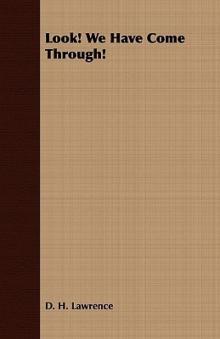 Look! We Have Come Through!
Look! We Have Come Through!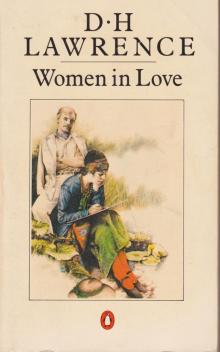 Women in Love
Women in Love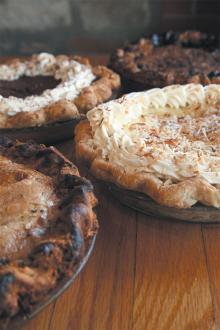 The Ladybird
The Ladybird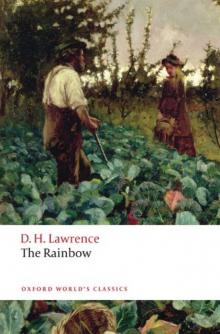 The Rainbow
The Rainbow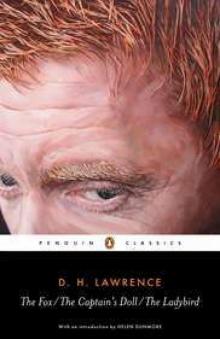 The Captain's Dol
The Captain's Dol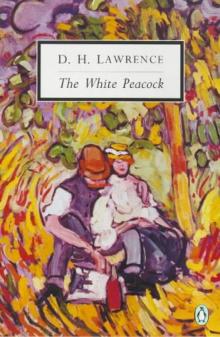 The White Peacock
The White Peacock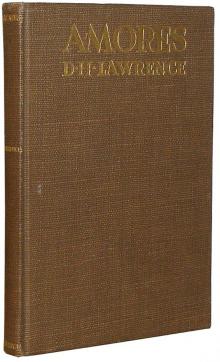 Amores
Amores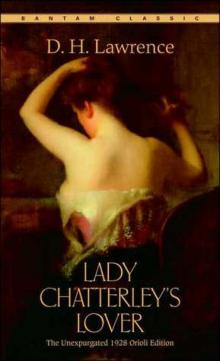 Lady Chatterley's Lover
Lady Chatterley's Lover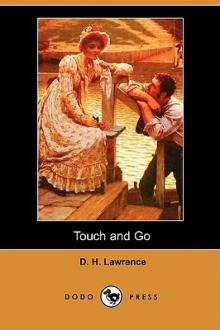 Touch and Go
Touch and Go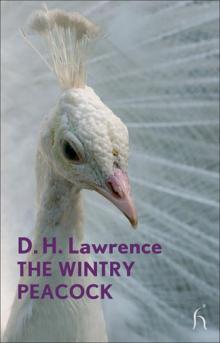 The Wintry Peacock
The Wintry Peacock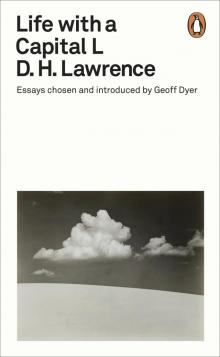 Life with a Capital L
Life with a Capital L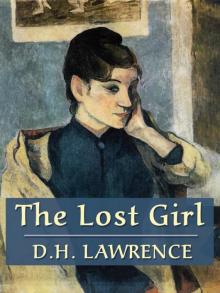 The Lost Girl
The Lost Girl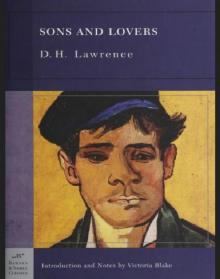 Sons and Lovers
Sons and Lovers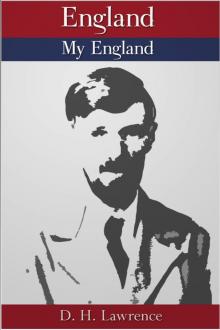 England, My England
England, My England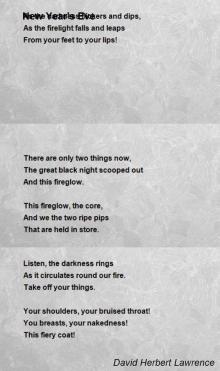 New Poems
New Poems Twilight in Italy
Twilight in Italy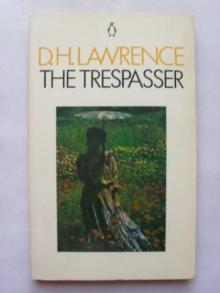 The Trespasser
The Trespasser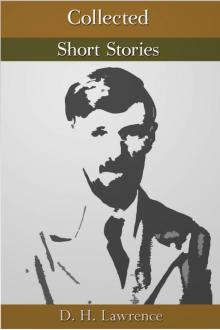 The Collected Short Stories
The Collected Short Stories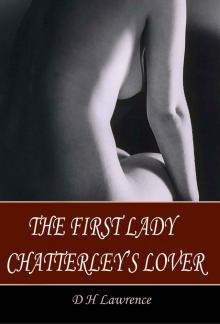 The First Lady Chatterley's Lover
The First Lady Chatterley's Lover Kangaroo
Kangaroo Bay
Bay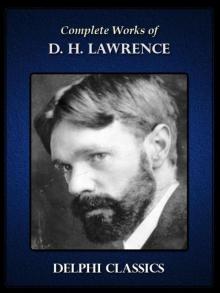 Complete Works of D.H. Lawrence
Complete Works of D.H. Lawrence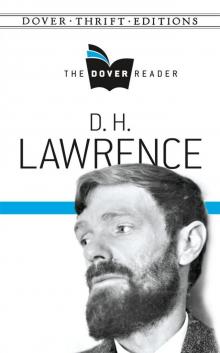 D H Lawrence- The Dover Reader
D H Lawrence- The Dover Reader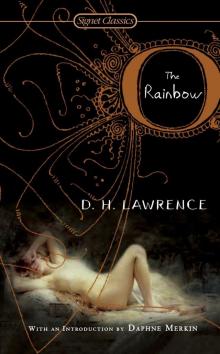 The Rainbow (100th Anniversary ed.)
The Rainbow (100th Anniversary ed.)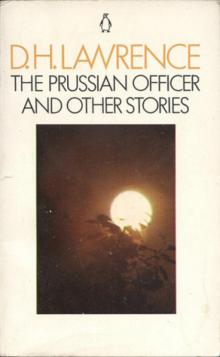 The Prussian Officer
The Prussian Officer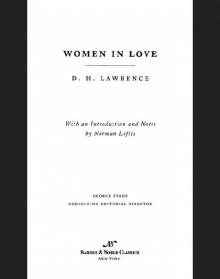 Women in Love (Barnes & Noble Classics Series)
Women in Love (Barnes & Noble Classics Series)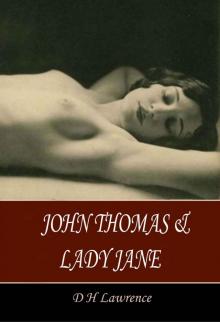 John Thomas and Lady Jane
John Thomas and Lady Jane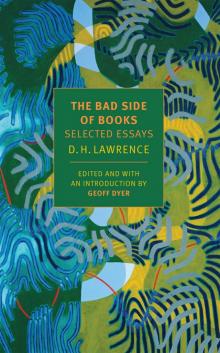 The Bad Side of Books
The Bad Side of Books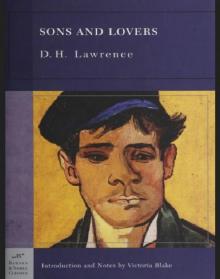 Sons and Lovers (Barnes & Noble Classics Series)
Sons and Lovers (Barnes & Noble Classics Series) Selected Stories
Selected Stories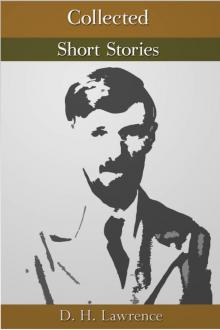 Collected Short Stories
Collected Short Stories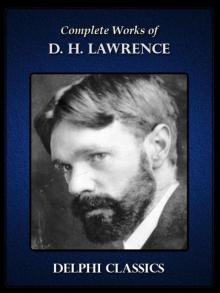 Complete Works of D.H. Lawrence (Illustrated)
Complete Works of D.H. Lawrence (Illustrated)